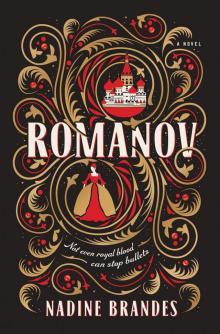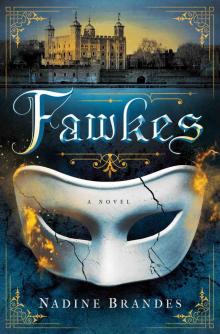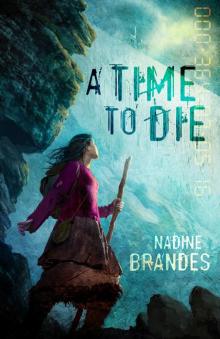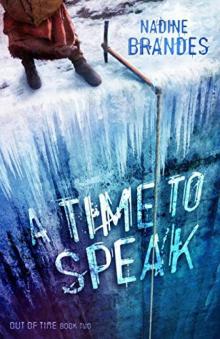- Home
- Nadine Brandes
Romanov Page 2
Romanov Read online
Page 2
“—spans miles, memory, and time,” Maria finished.
Our beloved Russia had filled the people’s heads with propaganda—painting Papa as a weak, careless tsar who discarded Russian soldiers’ lives. That was proof they didn’t know Papa at all. Our only defense was to show the Bolsheviks otherwise. Since arriving in Tobolsk, we’d grown to love our guards. I believe they grew to love us, too—or at least to see us as we truly were. Not as the revolution painted us.
But things were changing. We were separating. Though the people had overthrown Papa, the Bolsheviks had now overthrown the provisional government. Vladimir Lenin was in charge of Russia, and no one knew what he’d do. I was afraid. Our voices were losing power.
No one could outshout a revolution.
Maria clicked the valise closed. “Alexei feels this separation is his fault.”
I flopped backward onto my cot, staring up at the chipped paint on the ceiling. “Fault lies with the Bolsheviks. If they would simply acknowledge that we’re no threat to our beloved Russia, we could go live in peace in a small village somewhere.”
“That’s what this trial will finally decide.”
* * *
No one slept that night.
We took in the dawn with tired, red eyes and wilted wills. Olga—the mother of our sibling group at age twenty-two—went to check on Alexei. Tatiana spent the morning with Papa, gathering any last information she might need for dealing with the Bolsheviks. Maria and I had a breakfast of silence in our bedroom. A single word would break the dam holding back the tears. We needed to be strong today.
Maria hoisted her valise off the bed with one hand. I didn’t offer to help—I was born with all the mischief and she with all the muscles. We made our way to the entrance, where my emotional armor threatened to crumble. My family formed two lines on the entry rug.
Those who were leaving: Papa, Mamma, and then Maria.
Those who were being left behind: Olga, Tatiana, myself, and Alexei sitting in his wooden wheelchair and wrapped in a blanket so thick I could barely see his face beneath his mop of copper-colored hair.
All of us had to say good-bye.
A third line of bodies watched our farewells. Tobolsk soldiers. Papa went down the line and shook their hands. Every man looked somber—as though equally distraught to see Papa leaving. He handed out a few cigarettes and laughed about a recent card game with one of them.
Near the door stood a clump of Bolsheviks. The ones taking Papa away. I paid them no mind. This was our moment. My gaze met Papa’s. His eyes shone with the same heartache currently shredding my innards.
I hugged Mamma good-bye first. Then I faced Maria. She wept openly, which guaranteed that my eyes stayed dry. “You must write to me, too, Nastya.”
I hugged her stocky frame. “You will have to write first and tell me where you are staying.”
I approached Papa last. He crushed me to him and pressed his face into my neck. Never had I received such an endearing embrace from him. A sob broke free—shattering my resolve. “Ya tebya lublu.”
“I love you, too, shvibzik.” He did not remind me about the doll. I did not mention it.
“Take care of Alexei,” Mamma implored as Papa steered her away from her line of children she might never see again. “And take care of our secret,” was what she didn’t say. Even now, amidst fear and separation, we were to keep Alexei’s genetic illness hidden.
Alexei, though currently too weak to rise from his chair, piped up. “Perhaps I shall be the one taking care of my sisters.”
We all grasped on to the weak attempt at humor. It filled me with enough strength to watch Papa, Mamma, and Maria walk away into the crisp April air. Alexei shivered, and a word barely escaped my lips before the servants steered his chair back to his room.
Mamma had looked at me when she bid us to take care of him. Like me, she had been the second youngest. Her own brother had suffered from hemophilia. But hers had died.
Mine would not.
Even though Olga and Tatiana had tended soldiers during the war and gained healing knowledge, the bond between Alexei and me brought the true healing he needed.
I entered his room just as he drew a sleeve across his eyes. Dr. Botkin took Alexei’s pulse. He squinted at his pocket watch through his round glasses, his balding head shining beneath the single electric lamp. Alexei showed no shame over his tears. His weakness banished mine. I would be strong again.
“Well, Nastya. This might be my last time seeing them.” His blood disease was always threatening to take him from us. Life expectancy for someone with hemophilia wasn’t very high. Slightly higher if that someone was royalty with a devoted doctor.
I folded my arms. “You certainly won’t see them again if you continue to ride your toboggan down the governor’s stairs.” That had been months ago and Alexei was still recovering. I think he’d hoped he wouldn’t survive the ordeal. At this point, with no throne to inherit, a time of exile, and endless days of painful recovery, I could understand why he had trouble finding reason to live.
Dr. Botkin patted Alexei’s knee. “You shall be reunited, Tsarevich.”
Alexei and I shared a grin at the doctor’s assurance of something no one could control. But even empty promises could fill a heart for a moment.
Dr. Botkin applied the Fohn apparatus to Alexei’s joints and muscles to help keep back any atrophy.
“I can do that, Doctor,” I interjected, catching a cursory glance from Alexei.
The doctor glanced between us. Alexei nodded, so Dr. Botkin allowed me to spread the apparatus over Alexei’s legs as it warmed. Then he gathered his things and left the room. The moment the door closed, Alexei asked, “Do you have a spell, Nastya? I want to get better as soon as possible.”
I reached into my skirt pocket and pulled out a small tin. “Only one. I used the last of the spell ink on this, and I don’t know how to make more.” I was lucky I’d found a bottle of spell ink in this abandoned governor’s house in the first place.
I unscrewed the tin. At the bottom, against the thin metal, a single painted word glimmered like a rainbow through a spattered window or like a bubble under sunshine. I had seen many lovely things in my life, but spell ink would always be my favorite.
Oblegcheniye—the only spell I knew how to make. Relief. “This will ease the pain, but not heal it.”
Alexei nodded. “It allows my body to relax. It will still help.”
I sent a furtive glance toward the door before I slid a finger along the bottom of the tin until the word squirmed and attached to my skin. I transferred the word to Alexei’s skin—a snail trail of glimmering ink.
Alexei clenched his teeth under the brief pressure of my touch. “Oblegcheniye,” I whispered.
The shimmery ink sank into Alexei’s skin. Alexei expelled a pent-up breath and sank against the pillows. I shoved the empty tin back into my skirt, my heart pounding. No Bolsheviks caught us.
“That’ll last a few hours. Be patient. Soon you’ll be well enough to travel.” I smiled, glowing beneath the rebellion of using a spell right under the enemy’s noses. “It won’t be long now.”
“We were still left behind.” Alexei sighed. “I am a burden.”
“Tishe.” I flicked his shoulder with my pinkie. “You’re not fat enough to be a burden.”
He rolled his eyes and I knelt on the ground beside him. “Imagine this.” I adopted a mysterious tone. “Mamma and Papa have left us behind for secret tasks instead.”
Alexei’s head lifted at our game. “Tasks of spying.”
“Tasks of mischief.”
“Tasks of adventure.”
“Tasks of . . . magic.”
His grey-blue eyes widened. “And imagine this: We are, in fact, soon to be their rescue. As we speak, Dr. Botkin is incapacitating the Bolsheviks.”
“Bravo, Dr. Botkin!” I applauded, and we both giggled at the image of our dear doctor wielding his stethoscope as a weapon.
Almost as quickly as
the giggles came, Alexei sobered and his face fell. “But imagine that I never get strong enough to travel . . .”
I took his hand. “You’re breaking the rules, you know.” His fingers pressed against mine, a mere breath of a squeeze. I was careful not to return it too firmly. “You have been weak before and it has passed. Every time you think it’s the last time. And every time you regain your strength. This is no different.”
But it was.
This time the Bolsheviks were waiting to see the verdict after Papa’s trial. Once that judgment came, our fates would be decided. Then the Bolsheviks would take us where they willed. I much preferred the soldiers who let us play cards with them. Who shared their smokes with Papa and sat through my Sunday-night plays of silliness.
“We won’t be separated for long.” I stood. “In fact, I’m going to pack.” I left Alexei’s room at the same time his spunky little red-and-white spaniel pattered into the room. I glanced back long enough to see Alexei’s face brighten considerably as Joy plopped her two front paws on the side of his bed.
Then I went to the library.
The library of the Tobolsk governor’s house was a candle stub compared to the chandelier of the Alexander Palace library. Still, it was a place of light for me, no matter the size of the flame. Papa would read to us every evening in here.
Tonight, that wouldn’t happen.
No fire blazed in the hearth to combat the chill. The only fires lit were in the bedrooms. And even then, they were never enough to abolish the ice in our bones. Like St. Petersburg, Tobolsk was willing to release a heavy snowfall in any month of the year. The Irtysh River hadn’t even thawed yet.
No soldiers filled the library, but I browsed the shelves in any case, maintaining a constant posture of innocence—one of my more prized talents. I stopped at a book of poetry and flipped it open, scanning the words but thinking only of Papa’s departure— No. Of Papa’s mission. I would not think of the fact he was gone.
I would not.
We would be together again.
I snapped the poetry book closed and strode to the case that held Pushkin’s works. My fingers tingled, though I let them hang by my side while I searched with my eyes first. Nothing appeared different about the set of spines, but the bookshelves were deep.
I slipped one book from the shelf, glancing into the dark space behind it. Red and gold paint resisted the shadow. A shimmer of secrets. Of hope. Of adventure.
The Matryoshka doll.
I dipped my fingertips into the shadow.
“You should not be in here unattended.”
My nerves scraped against my skull at the sudden voice, but my body did not react—trained to resist reflexive surprise. Everything within me wanted to snatch my inquiring hand back and pretend I’d seen nothing. Instead, I lifted my head and slipped on a smile. “Is reading so dangerous?” I almost choked on the last word when my gaze landed on the source of the voice.
Soldier.
Stranger.
Bolshevik.
He wasn’t one of the kind guards. This was a man who didn’t know us, didn’t know Papa. He stood stiff in his Bolshevik uniform, sporting the red star badge with a hammer-and-plough emblem in the center. He appeared hardly older than me, though I couldn’t quite make out all his features beneath his budenovka felt cap. The elegant shape of his eyes told me he came from Eastern Russia. Somewhere local, maybe? Old eyes in a young face.
“You must be new.” I tried to sound friendly. Every new soldier—or Bolshevik—was a new mission to show them us and not the revolution’s portrayal of us. But with the departure of half my family, I wasn’t sure I could manage it today.
His gaze went to the shelf. “Find anything interesting?”
I had a feeling he wasn’t talking about books. “I find every book interesting.” I slid the Pushkin volume from the shelf, subtly scooting the Matryoshka doll deeper into the shadows with the tips of my fingers. The Bolshevik didn’t smile, but that wasn’t unusual. Emotions were private—even the fake ones. We Russians weren’t required to share any amount of emotion we didn’t want to.
The Bolshevik passed through the doorway and approached me, stepping into the dim light.
“What’s your name?” I asked to contrast the tense silence.
He stopped a few feet away and held out his hand for the book. I swallowed hard. Had he overheard Papa’s instructions?
I handed him the volume. “Pushkin.”
“Everyone likes Pushkin.” He said it in a way that made me feel as though I was shallow. Average. Common.
We couldn’t have that. “Allow me to make a different recommendation.” I placed a children’s book of fairy tales in his hand. I meant it as a joke, but he glanced at the cover with the same indifference he’d maintained since he stepped into the library.
That was the last of my cordial energy. This Bolshevik might take some time to soften, but I would get through to him. After all, what else was there to do in Tobolsk?
I snatched Pushkin back from him and plopped onto a sofa to read. Hopefully he’d go away, or at least be satisfied that I wasn’t doing anything dangerous. But he stood there, flipping through the book of Russian fairy tales.
“My name is Zash.” He shut the book and returned it to its place on the shelf.
There. Was that so hard? “I’m Nastya.” I knew he knew my name. Up until a year ago, he would have bowed to me. Still, I wanted him to understand I expected no formalities. The first step of getting through to a soldier was to show them I was human and that I did not expect grand duchess treatment.
“I know who you are. I know what your family has done. Do not expect that I will fall for the cheap friendliness with which your father has brainwashed the other soldiers.” He finally left.
I pretended to read. My eyes moved back and forth and I turned pages at a rate equal to my average reading speed, but my mind processed only the terrible itch to retrieve the doll. I focused on that and not the burn beneath my skin that lingered after Zash’s insult to my character—to Papa’s character. That bothered me most.
Zash believed the propaganda about Papa—that Papa was a weak ruler, that he cared not for the people, that he threw parties while peasants starved, that his wife ruled over him. I couldn’t blame Zash—how could he know any different? But it made me that much more desperate to set him and the other Bolsheviks right.
Eventually the candles burned to stubs. I finally returned the Pushkin book to its spot on the shelf. Then I glanced around the room . . . and slipped the Matryoshka doll into my sleeve.
2
A grenade would be safer in the palm of my hand than the Matryoshka doll.
I sat on my bed in my room, staring at the small wooden toy. A regular Matryoshka doll typically held layer upon layer of miniature dolls inside it. Did that mean this doll held layers of spells?
I turned it round and round in my hand, running a thumb over every inch of wood. No seam. Was there no way to open it to inspect the spells inside? Maybe it was filled with spell ink instead. I shook it and the inner layers rattled against each other. I tried to twist it open, but it didn’t give.
This doll was made by Dochkin. Papa instructed me to protect it. He must know what was inside. So I let it be. Despite my nickname of imp, I respected Papa too much to toy with something he claimed might be our family’s salvation. I placed the doll on the shelf across the room that held a display of candles, music boxes, and trinkets.
The best place to hide an item was on your person. But when you couldn’t manage that, the next best place was to hide it in plain view. People searched there last.
* * *
“Any news?” A Bolshevik snickered as I passed. They’d been with us for two weeks and not one of them had softened. Fifty remaining Bolsheviks with guns who didn’t care to know us.
Fifty men who laughed at me, knowing I’d received no letter from Maria. The calculations didn’t add up. She should have arrived in Moscow within three or four day
s, and then a couple days for them to settle in and Maria to write, then three days for the letter to reach me.
Still, no letter.
I tried not to be concerned. The post took a long time. Besides, the Bolsheviks had to examine every piece of post. Perhaps the trial had kept her too busy. Maybe they weren’t allowing her to write.
Longing spiked in me, but I shut it down. I wanted to be out of Tobolsk. Out of Siberia. I wanted to be home. At the very least I wanted permission to make a place our home—any place, as long as it was ours. Together.
My thoughts drifted beyond my control—to the unthinkable. That the train had been attacked on the way to Moscow, or that the revolutionaries had gone after Papa on his way to the trial, or that the Bolsheviks had pulled out their guns and—
“Has the post come?” Alexei asked weakly as I passed his room. He lay in bed, attached to the electrotherapy machines to stimulate his weak leg muscles. I was out of spells with which to help him. He had only just begun to sit up on his own.
I shook my head. Then I returned to my room and toyed with the Matryoshka doll again. Nothing had changed. Did I need to speak a certain word to prompt it open? My bottle of spell ink was dry, and Rasputin had never told me how to make more.
The doorknob creaked, and I barely returned the doll to its spot before my older sister Tatiana entered. Her short auburn hair flipped out elegantly above her shoulders. Always put together. Always beautiful.
“I have work for you,” she said.
Always bossy. But I’d take any distraction I could.
She shoved a sewing kit into my hands. “Before she left, Mamma told us to dispose of the medicines.”
Medicines was our code word for “jewels.”
“We will do our mending in here,” she said in a tone as crisp as the frozen leaves outside.

 Romanov
Romanov Fawkes
Fawkes A Time to Die
A Time to Die A Time to Speak
A Time to Speak